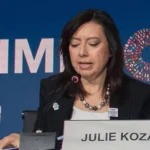
The International Monetary Fund (IMF) has indicated that it fully backs efforts aimed at reviewing utility tariffs in the country’s energy and power sectors.
The IMF, however, maintains that this support is based on the fact that the expected increase will go a long way to ending long-standing inefficiency in the electricity sector, supporting much investment and dealing with the accumulation of areas in the energy sector.
Director of Communications at the IMF, Julie Kozack, said this in response to questions from journalists during a press conference in Washington DC, USA.
Mrs Kozack added that the IMF also fully supports “broader energy sector reforms, including private sector participation in the operations of the Electricity Company.
The Director of Communications at the IMF maintained that this is part of a broader plan to strengthen the performance of state enterprises in Ghana and to reduce fiscal risk.
Proposed Utility Tariff Review
The comments by the IMF are coming at a time that the Public Utility Regulatory Commission (PURC) is working to review the utility tariffs by some significant margin from October 1, 2025.
The PURC is currently embarking on a stakeholder engagement over the proposed adjustment being put forward by the various utility companies in the country.
The tariff review is part of measures to help deal with huge debts in the energy sector.
The government, during the recent engagement with the IMF, agreed to work with PURC to embark on this major review from October 2025.
The Electricity Company of Ghana, for instance, has proposed more than a 200 per cent hike, but persons close to the PURC say that request will not be approved.
Some economists have raised concerns about the impact of any huge increase on the economy, inflation and cost of living.
Ghana’s IMF programme
Responding to other issues, the Director of Communications at the IMF also praised Ghana and some key progress made on the programme.
She highlighted how the government has worked hard to improve financial management reforms.
“Growth, for instance, continues to outperform expectations,” the IMF Communications Director added.
Mrs Kozack said the country’s microeconomic situation is also improving, while the new administration is taking some bold measures to get the programme back on track as well.
On May 17, 2023, the IMF Executive Board approved a 36-month Extended Credit Facility (ECF) arrangement worth SDR 2.242 billion (about US$3 billion). This included an immediate disbursement of SDR 451.4 million (about US$600 million), with subsequent disbursements tied to successful programme reviews.
The programme’s priorities include:
- Restoring public finances to a sustainable path by boosting domestic revenue and improving spending efficiency, while protecting the vulnerable.
- Expanding social protection, including doubling the benefits of the LEAP cash transfer programme and increasing allocations for school feeding.
- Implementing structural reforms in tax policy, revenue administration, and public financial management and addressing weaknesses in the energy and cocoa sectors.
- Controlling inflation through tighter monetary policy, eliminating central bank financing of the budget, and maintaining a flexible exchange rate to rebuild reserves.
- Preserving financial stability and encouraging private investment, growth, and job creation.